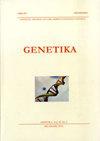土耳其人群中四种人类多巴胺通路基因与成人注意缺陷多动障碍的关联分析
4区 农林科学
Q3 Agricultural and Biological Sciences
引用次数: 0
摘要
本研究旨在探讨多巴胺转运蛋白基因(DAT1)、多巴胺受体D1 (DRD1)、多巴胺受体D2 (DRD2)、多巴胺受体D3 (DRD3)、多巴胺受体D4 (DRD4)基因变异与成人注意缺陷多动障碍(ADHD)的关系。前瞻性分析病例对照研究。本研究共纳入来自土耳其西部人群的128例ADHD病例和100例非ADHD对照。从外周血中分离DNA。基因型和等位基因频率p值采用卡方(c2)和Fisher精确检验计算。其他统计分析采用SPSS 20.0版软件进行。采用聚合酶链反应和限制性片段长度多态性(PCR-RFLP)技术鉴定了DAT1、DRD2、DRD3和DRD4变异的基因型。DRD4基因外显子3 VNTR多态性的4R等位基因和4R/4R基因型在病例组和对照组中都是最常见的。ADHD组4R等位基因比对照组有统计学意义(p=0.01)。DAT1、DRD2和DRD3多态性的基因型和等位基因频率在ADHD病例与非ADHD对照组之间无统计学差异。仅在DRD4外显子3 VNTR多态性与成人ADHD之间发现有统计学意义的关联。然而,为了证实这些基因变异对ADHD和ADHD亚型的影响,需要进一步研究更高的群体规模和更多的候选基因。本文章由计算机程序翻译,如有差异,请以英文原文为准。
Association analysis of four human dopamine pathway genes with adult attention-deficit hyperactivity disorder in a population from Turkey
In this tudy, it was aimed to investigate the association/s between dopamine transporter gene (DAT1), dopamine receptor D1 (DRD1), dopamine receptor D2 (DRD2), dopamine receptor D3 (DRD3), dopamine receptor D4 (DRD4) gene variants and adult Attention Deficit and Hyperactivity Disorder (ADHD). A prospective analytical case control study. A total of 128 ADHD cases and 100 non-ADHD controls from Western population of Turkey were included in this study. DNA was isolated from peripheral blood. Genotype and allele frequency P-values were calculated by Chi square (c2) and Fisher Exact tests. Other statistical analyses were carried out using SPSS program version 20.0. The genotypes for the DAT1, DRD2, DRD3 and DRD4 variants were identified by polymerase chain reaction followed by restriction fragment length polymorphism (PCR-RFLP). 4R allele and 4R/4R genotype of Exon 3 VNTR polymorphism in the DRD4 gene were observed to be the most frequent one in both case and control groups. 4R allele was found to be statistically significant in ADHD group than the ones in control group (p=0.01). No statistical differences in the genotype and allele frequencies were observed between ADHD cases versus non-ADHD controls for DAT1, DRD2 and DRD3 polymorphisms. A statistically significant association was found only between DRD4 Exon 3 VNTR polymorphism and adult ADHD. However, to confirm that these gene variants contributes to ADHD and ADHD-subtypes, further studies with both higher population sizes and many candidate genes are needed to be investigated simultaneously.
求助全文
通过发布文献求助,成功后即可免费获取论文全文。
去求助
来源期刊

Genetika-Belgrade
AGRONOMY-GENETICS & HEREDITY
CiteScore
1.80
自引率
0.00%
发文量
1
审稿时长
6-12 weeks
期刊介绍:
The GENETIKA is dedicated to genetic studies of all organisms including genetics of microorganisms, plant genetics, animal genetics, human genetics, molecular genetics, genomics, functional genomics, plant and animal breeding, population and evolutionary genetics, mutagenesis and genotoxicology and biotechnology.
 求助内容:
求助内容: 应助结果提醒方式:
应助结果提醒方式:


